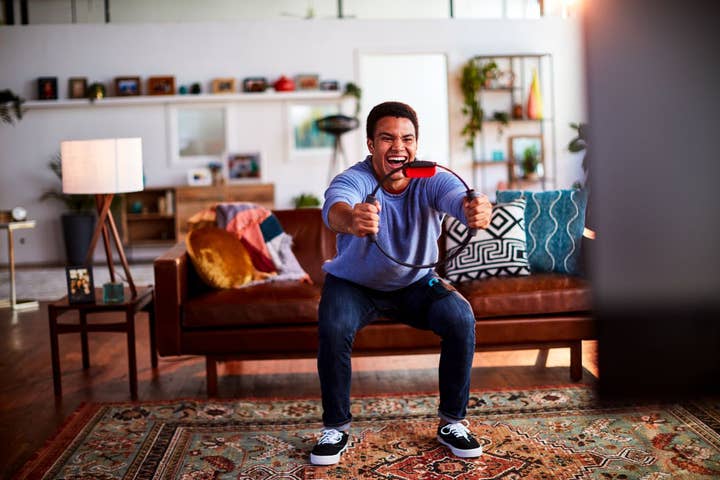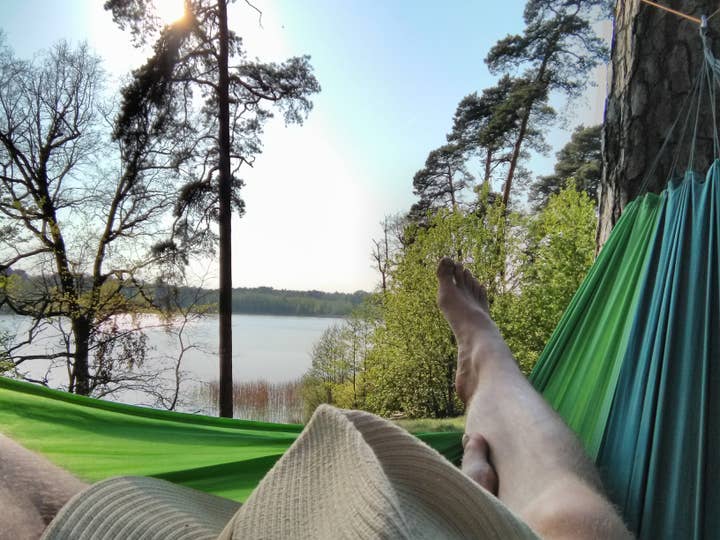How to avoid burnout
Indie developer Sos Sosowski shares tips and tricks for maintaining a healthy work/life balance
"We have probably all been working too much at one point or another in our careers. But, especially now most of us are stuck at home, it's important to take care of yourself and not to burn out."
So opened a talk by indie developer Sos Sosowski during this month's Ludicious X digital conference. Entitled 'Don't burn down your house,' the session explored why developers are so susceptible to burnout and offered a variety of simple solutions that can help avoid it.
"To ruin one's health or become completely exhausted through overwork," is the dictionary definition of burnout that Sosowski provided during his talk. He emphasised that there is "zero discussion" about the cause of burnout, that it is only caused by overwork, so developers need to reevaluate their approaches if overwork is within their ranks as well.
We've compiled the key takeaways from this session into a useful guide, and you can watch the full video of Sosowski's talk at the bottom of the article.
Are you burning yourself out?
Sosowksi noted that while many developers love video games and particularly creating their own, there are other things that they need to take care of in their life. He posited three questions that people should always ask themselves to ascertain whether work is taking over.

- What is your hobby?
- How often do you hang out with friends?
- When was the last time you went on a vacation that was for longer than a week?
Sosowski emphasised that these need to be unrelated to work.
"It's important to have a hobby that is not related to work," he said. "It's important to hang out with your friends, and not just to play board games, video games or to discuss games or the games industry. Just hang out and have time outside of the one thing you do.
"And go for a vacation, do something else. It's important to have a slice of your work and have a slice of your life and keep these as separate slices. Remember to keep a line between your work and your life."
He also emphasised that sightseeing during a trip to a conference or any work-related travel does not count as a vacation. If work and life were on a Venn diagram, it should not be a complete circle but two that only overlap a little.
Why do developers burn themselves out?
"Passion" is often used as an excuse to overwork, whether its developers who are "passionate" to work on a AAA title or indies whose game is a "passion project." Sosowski acknowledged this but warned it can be used against developers.
"Most developers asked why they make video games answer: 'Because I always wanted to,'" he said. "But employers will abuse that to force you to crunch, to overwork. Because you're passionate, you'll be willing to put more effort than you have to into the things you do.
"Your work is not your life, and your game is not you."
"Even if you don't have an employer and you're an independent developer, you need to take care of yourself because it's easy to get lost in what you do. You need to constantly remind yourself not to work too much."
Sosowski urged developers to remember two things: your work is not your life, and your game is not you.
Reiterating his earlier advice, he said that creators need to "separate the things you like to do for work from the things you like to do for life outside of your work. Even if you love work, you need to do something that is not it."
He also emphasised that "your game is not you", given how personally developers become invested in their work: "If your game is bad, you're not bad. If it gets criticised, you're not being criticised. If your game fails, you do not fail. You are not your game, so take care of you and not of your game because if there's no you, there is nobody to make your game."
'Cheat codes' to avoid burnout
Sosowski offered seven key suggestions -- which he referred to as "cheat codes" -- on how developers can break up their workload and restore a more healthy work-life balance. These were simple solutions that can be tailored to anyone's daily life, but putting effort into attempting them is important.
Cheat 1: Limit your work to working hours
No one should work more than nine hours a day, Sosowski said. Anything above this is too much, eight hours is a good standard, and anything less is even better.
Even if you're in the middle of something you're really excited about, set yourself an alarm so you clock off in time. That excitement will linger so you'll be raring to go the next day, and you should be getting excited about doing things outside of work as well.
"You do not work at weekends. You want to reply to an email? No, no, no -- that can wait. People know you have a weekend."
It's also important to get plenty of sleep, and to not let your hobbies and social activities get in the way of this.
He urged people to limit the amount of time they spend with their work computer for non-work related reasons. There should be a clear divide between your work and leisure devices. If you want to play games, do so on console or mobile. Save film and TV viewings for tablets or your television.
Cheat 2: Weekends are sacred
"You do not work at weekends," Sosowski said. "You want to play a game? Sure, that's not work. You want to reply to an email? No, no, no -- that can wait. People know you have a weekend."
He urged developers to make sure they take the whole weekend off, no matter how quick or perhaps beneficial a work-related task might seem. He recalled a time he had been offered the chance to deliver a TED talk, but it was on a Sunday so he turned it down. In hindsight, it would have been a great business opportunity, he said, "but [he] had a nice Sunday, so it was worth it."

Cheat 3: Work out
Try to work out every day. Even if you don't accomplish this and only manage once or twice a week, you will still feel the benefits of doing some amount of exercise.
"You're not getting any younger," Sosowski said. "If you don't work out, you just sit in a chair and work in front of a computer, you're bound to have some health issues. You need to take care of that body because that body is what makes your video games."
He offered three simple rules from his own personal workout routine:
"You need to talk to other people, face to face, verbally and non-verbally. When the pandemic is over, go and meet your friends regularly"
- Make sure you exercise at least three times a week, which leaves plenty of time for socialising and other activities on other days.
- Never skip Mondays. If you exercise on Monday, that leaves only two days of the week you need to make time for it. Starting the week with exercise gets you a third of the way to your goal, so try to make time "no matter how exhausted you are after a cool weekend."
- Don't forget to stretch and warm up. Stretching, rolling your arms, even a yoga pose will help prepare your body for exercise.
"It hurts a lot but it's going to help you out, especially because we all have this sedentary position," Sosowski added. "Even if you have a standing desk, you need to remember this. It takes extra time, but it's really helpful for you to stay healthy."
Cheat 4: Experience stuff
"Imagine writing a book, but you've never done anything else other than writing this one book. What the hell is that book going to be about if your life is just writing a book? What is it based on?"
Since developers put themselves into their games, they need to be more than just a game maker. Sosowski encouraged people to "have an adventure, go outside, maybe do something crazy" in order to gain more varied experiences of life.
"It doesn't have to be good, it doesn't really have to be bad, just something you might have a memory of so you can use that to build up on the experience and put that into the thing you're making."
He observed that "bad experiences are still experiences." Even if you go somewhere and things go wrong, like the weather's terrible, it's still going to give you a story to tell and experience you can draw from if you need it for your work.
"If you just sit in front of a computer, you're bound to have health issues. You need to take care of that body because that body is what makes your video games"
Cheat 5: Employ all senses
Sosowski alluded to developmental issues that some young children can have if they "are hooked on computers and don't really go outside." But while adult senses are already developed, it's still important to utilise those senses by going outside, touching things, smelling things -- even walking barefoot on the ground. All of these things can hone your various senses, which is another key aspect of gaining more experiences.
He acknowledged that COVID-19 lockdown measures have limited people in terms of opportunities to go outside and meet other people, but as things begin to ease, everyone should make time to do these things.
"It's really important," he said. "Go smell some flowers."
Cheat 6: Broaden your horizons
"I know we make this digital art of video games, which is the pinnacle of the audio visual industry because it's interactive and you can tell stories in new and creative ways -- but it's also important to know the other aspects of culture," Sosowski said.
He rattled off several suggestions, starting with going to see a play or other theatre production. Building on the previous point, this utilises more senses than going to the cinema because there are live people on stage, so the production is more "real."
Movies are still an option, of course, but maybe consider seeing an art cinema piece about something unusual rather than just the blockbusters -- this will help broaden your horizons. On a similar note, go and experience live music, either at a festival or a concert (when the pandemic is over, of course). Perhaps get a friend to take you to hear something you've never heard before -- like opera, for example.
Museums and art exhibitions are also worth looking into, or simply go for more walks in new areas.
"We need to experience culture, all aspects of it," said Sosowski.

Cheat 7: Go spend time with nature
Sosowski elaborated on the importance of spending time with nature by discussing how the human body is specifically equipped to take in more details while doing so.
"If you know colours on a computer, 16-bit computers have five bits for red, five bits for blue but six bits for green -- and that's not an accident," he said. "It's because the human eye can see more shades of green, because green is everywhere. You need to go outside to a forest, a lake, a mountain, a seaside. Spend some time in nature."
Sosowski suggested close to a full day around nature every fortnight. It's also important to occasionally spend a day doing absolutely nothing, with Soswoski adding: "If you do it in and around nature, that's two things in one."
Cheat 8: Meet other people
Sosowski acknowledged that socialising, networking and meeting new people isn't for everyone. Like every industry, the games business has its introverts as well as its extroverts, but it's worth pushing yourself to meet new people -- and not just for the potential new professional opportunities that might arise at an industry event.
"You need to experience socialising," he said. "This is one of the basic human needs: interaction and language. You need to talk to other people, face to face, verbally and non-verbally. When the pandemic is over, go and meet your friends regularly."
Cheat 9: Prepare your quest inventory
His final tip was to emulate something he has started to do. Sosowski has a backpack ready to go when he needs to get away from work, which he referred to as his "quest inventory."
The pack contains a portable hammock, a book, perhaps a musical instrument to play, headphones to block out external noise, a water bottle to stay hydrated, and some food so he doesn't need to leave wherever he puts his hammock for a few hours.
He concluded: "Remember, it's not about doing all of this because you also need to do household chores and wash your laundry, stuff like that. But it's about trying, and it's about the work-life balance. It's not out there for you to find, it's there for you to pursue.
"This never-ending pursuit is what is actually the balance. Trying to do life, trying to do work, and mixing all these things in different ways. Try to be good to yourself, but you are what's important."
You can watch Sosowski's full talk below:


